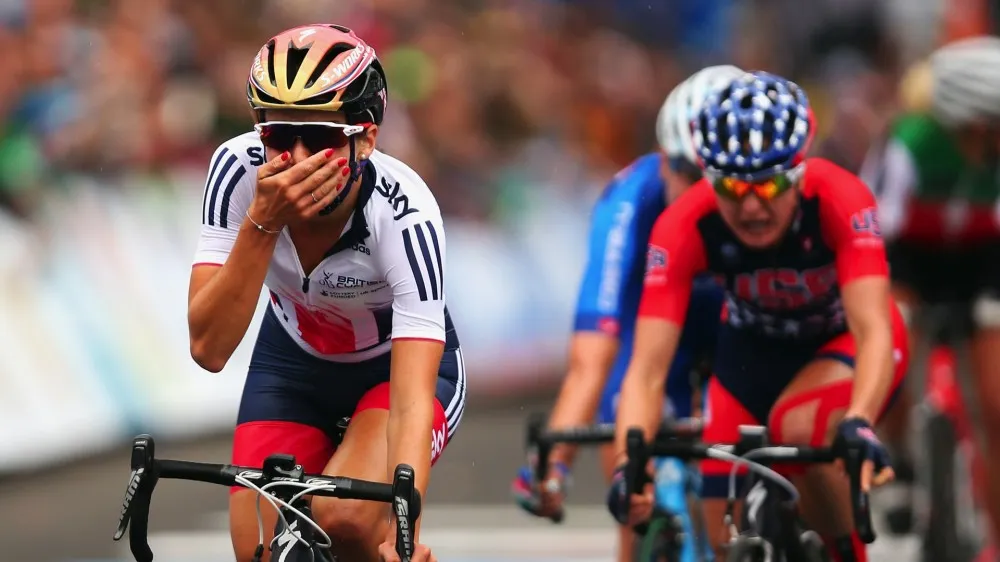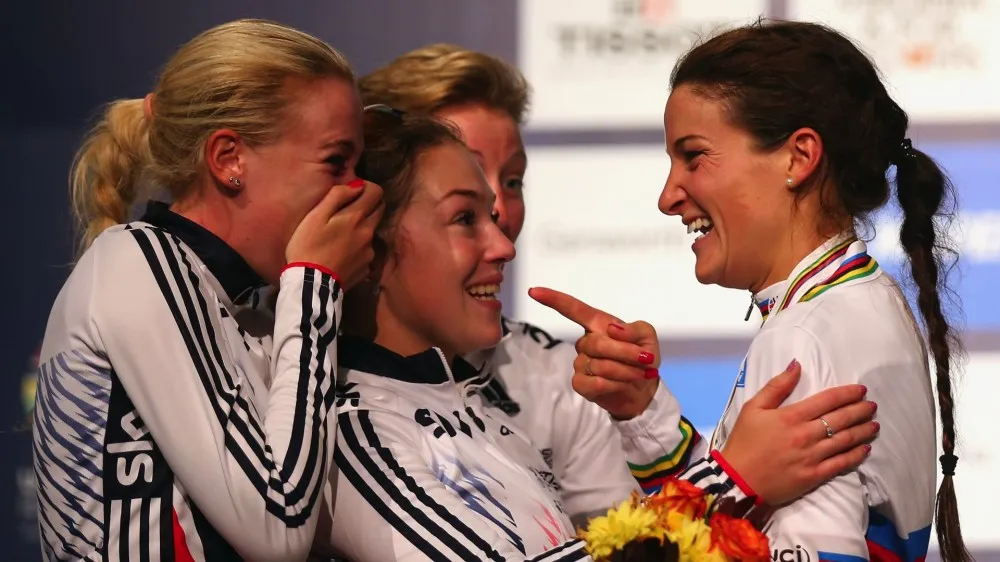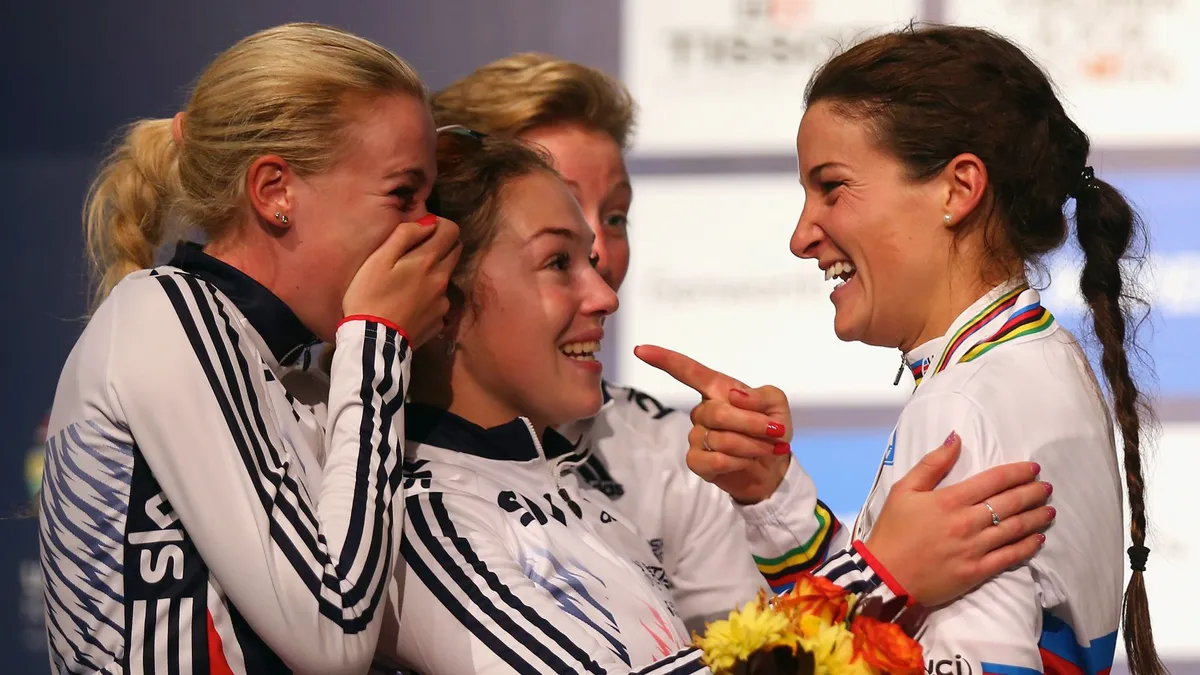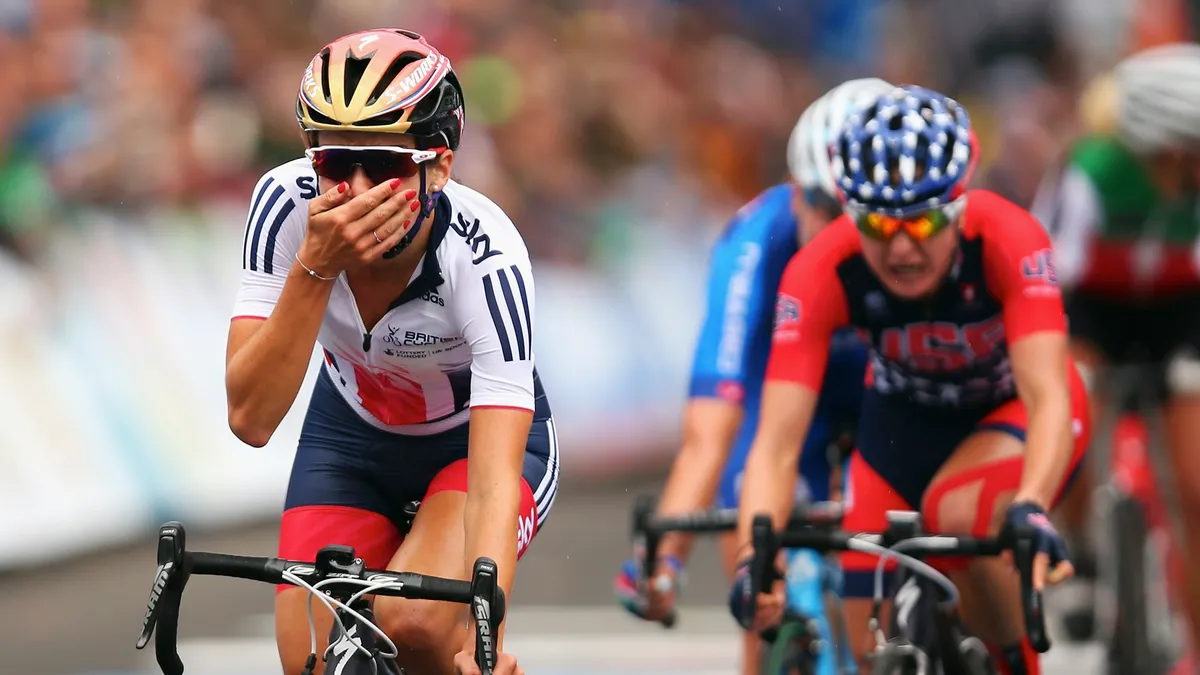Lizzie Armitstead is riding high, and well she should be. Starting 2016 in the rainbow stripes of a world champion, she laid out her goals and is striking through the list.
Goal number one was to win at the Tour of Flanders, which she did in spectacular style with a nailbiting final sprint against Emma Johansson.
But her main ambition for 2016? To turn the silver she won at the London 2012 Olympics into the gold she dreams about in the Rio 2016 Olympics.
With the Olympics fast approaching, Armitstead's attention has turned to preparation for the mountainous course.
- Win VIP tickets to the 2016 Aviva Women's Tour
- Women's cycling on BikeRadar
- Specialized Women's SL Pro jersey and bib shorts review
Preparing for Rio 2016
While she’s known for her powerful sprint, Armitstead is not an out-and-out climber. The Rio 2016 course involves several major climbs, with the steepest gradients over its 130.3km course reaching 13%. Climbing ability is therefore an attribute Armitstead must master ahead of the Games.
"My preparation for Flanders was based completely around the course – a series of short punchy climbs.” Armitstead tells BikeRadar. "Rio is mountains, not hills. I’ve spent May in the mountains doing long rides, getting used to holding threshold power for a long period of time. It’s been quite difficult, it’s been a challenge because it’s not how I am used to training, but I’m getting there. I’m getting more confident in mountains."
As for her specific training regime? "At this point it’s basically just endurance and strength exercises, and riding in the mountains," she continues. "I don’t want to peak too soon, so the shorter intervals and more intense exercises I’ll do closer to the time."
Nutrition is also an important part of the equation, and Armitstead has a refreshingly no-nonsense attitude to keeping fuelled for riding.
"It's really important never to skip a meal, and to have a good breakfast so you feel full and ready to ride" she comments. "Having protein straight away after the ride is also something that's really encouraged. Mid-ride, I take cereal bars or bananas out. I try to stay away from the sugary things you can buy on the market."
Her preparation for Rio also sees Armitstead reunited with Emma Pooley, with whom she rode at the London Olympics. Pooley, who retired from road cycling to focus on triathlon and running, has come back for the 2016 Olympics to compete in both time trial and road, and Armitstead welcomes her return.
"It's like she'd never been away, really," Armitstead says, commenting on her experience of racing with Pooley again at the women's Tour de Yorkshire. "She hasn't changed, she's still the athlete that she was, and it's exciting that we both get to go to Rio together.
"I've said before, she'd be mad not to come out of retirement for this course – it really suits her," she adds, commenting on Pooley's well-known climbing ability.
It's these complementary skills that make these two athletes work so well together, Armitstead feels. "We're both quite different athletes. Emma is a pure climber, I'm someone who has a bit more of a sprint, so our different talents complement each other in a race tactical situation."
Talking of tactics, these will be essential if Armitstead is to take the win at Rio, though she is understandably guarded about giving away too many details of the game plan. "Obviously, there’s Emma involved, so it’ll be a kind of dual-pronged attack, lets say," is all we can get out of her.
Controversy in cycling
With the spotlight on cycling growing in the run up to the Olympics, not all the stories have been positive. The recent claims of sexism in British Cycling from several top athletes, and the resignation of technical director Shane Sutton, have dominated recent headlines. Perhaps understandably, it's an issue that Armitstead declines to say to much about.
"My view on it is that it’s very much individual cases. For me, I’m a professional road rider, and the support team that I have comes from Boels Dolmans – I don’t really have anything to do with British Cycling except at [events like] the World Championships where I wear a jersey. It wouldn’t be fair for me to comment on it until the investigation has taken place, I think."
Controversy has also plagued the technical side of the sport. No sooner were disc brakes finally permitted in the pro peloton than they were banned again, as a result of an injury suffered by a rider at Paris-Roubaix. Although Armitstead has herself not ridden with disc brakes, it's an issue she has a firm opinion on.

Armitstead at the World Championships in 2015, at the moment she realised she had taken the title
"As a rider, the equipment we use is sponsor led. But I’ve done my reading and looked at the debate and I think that I would be on the side of not having them in the peloton," she says.
"I think that would be the safer option. It’s a combination of things. It’s the risk of injury from being in a crash and being cut by one. The greater braking power inevitably will lead to more crashes in corners, if you’ve got a peloton of 200 people braking later… it doesn’t make sense for me [to have them]."
Prize money, women's cycling coverage and the home crowd
While gold at the Rio Olympics is Armitstead’s major goal for 2016, and indeed for her career, the impact of riding front of a home crowd at the women’s Tour de Yorkshire is not to be underestimated. A new event for 2016, the one-day race took place on 30 April 2016, coinciding with the second day of the three-day men's Tour de Yorkshire. The event started from Armitstead's home town of Otley, and the experience was a moving one for the Yorkshire lass.
“It was surreal, really strange. I didn’t expect to feel quite so emotional like I did," she explains. "Doing the neutral start around Otley, I had a lump in my throat. I felt really proud of how the sport had come on, in my home particularly. When I first started, I only had my dad to train with. Now there are big groups of women, and families, out on bikes."
There had been plans to televise the entire three-hour race live, though bad weather scuppered this ambition, leaving many fans deeply disappointed. The women's TdY was also notable for starting something of a prize-money arms race in women’s cycling. The prize offered, £15,628 (or €20,000) for the winner, made the event the most lucrative women’s road cycling event in the world.
However, that title was stolen shortly thereafter by the RideLondon Classique, with the prize for the winner a cool €25,000 (around £19,060) and a total prize fund of €100,000, plus a commitment for the whole women's race to be televised live on BBC Sport.
In both cases, the prize fund was equal to or greater than the money offered to the equivalent men's races.
The question of money and media coverage is major one for anyone interested in the growth of women’s cycling. The sport needs both, but which comes first?
"It's a chicken and egg situation," says Armitstead, "And it's difficult. But I think the recent bidding war to become the world's most lucrative race brought headlines with it as well, which can only be a good thing."
Welcome though it is, it's important that prize money doesn't overshadow the importance of taking opportunities to demonstrate the skill, stamina and expertise of the pro peloton in front of a global audience, Armitstead adds.
“If people are bidding to have the most lucrative race then that’s a good thing. But for me, it’s more about full-length stages to showcase the strength of women and what we’re capable of doing, what the sport is capable of, rather than a big prize fund," she says.
The upcoming Women's Tour is one such example. Over five days of racing, the top pro women's cycling teams in the world will compete in an event that's immensely popular with racers and fans, and marks the first European event in the inaugural UCI Women's WorldTour series. The Women's Tour attracts crowds of supporters who line the route and create an electric atmosphere at the stage starts and finish lines. Armitstead is looking forward to it.
"It’s unlike any other race," she smiles. "It draws the biggest crowd, and it’s really exciting. I haven’t unfortunately been able to finish one yet, through illness, and through crashing last year, so that’s my aim – to get through it and enjoy it!"
If you want to be there yourself, you can win VIP tickets to the stage finish of your choice, plus the chance to ride in one of the convoy cars during the final, climactic stage.
Wearing the rainbow stripes
While many speak of the 'curse of the rainbow stripes', this is something Armitstead has clearly not succumbed to, despite the additional pressure that comes with the prestigious jersey. With the jersey comes ever-increasing numbers of requests for media interviews, appearances and comments.
"It's brought with it a lot of expectation and pressure, and a lot of time commitments" Armitstead admits. "I'm very lucky I have an agent, Emma Wade, who helps me manage my time. It's difficult for me to say no to people – there's always someone you could help out. I try to do as much as I can, but I have to keep a balance, and my agent is great with that."

The rainbow jersey of the world champion – while it brings added pressure, it also brings advantages that Armitstead has most certainly capitalised on
Armitstead has also become something of a figurehead for women's cycling, and is frequently asked for her views on all manner of related questions including everything from how to increase coverage to boosting participation. Although a passionate advocate of women's cycling, those questions require complex solutions, and while is Armitstead is happy to comment, she's admitted in an interview with BikeRadar's sister site Cycling News that she finds this expectation frustrating at times.
Maintaining a balance between her additional responsibilities as a world champion and her training for the Rio Olympics is critical if Armitstead is to succeed in her medal ambitions. And the pressure that comes with the jersey is itself balanced with certain psychological advantages.
"Every time you look at it, it reminds you that on one day you were the best in the world, you've competed on the most pressurised day, and you've done it," Armitstead says. "It's good to go into a race [wearing the jersey] being the feared one, rather than fearing someone else.
"Mentally, I think I’m going into Rio completely differently than I went into the London Olympics," she continues. "In London, I was hoping for a top 10, and it was my first time at the Olympics and I didn’t really know what to expect. Whereas this time around I know exactly what to expect, and I’m excited about trying to turn silver into gold."
Lizzie Armistead is an ambassador for Kellogg’s Special K Nourish, a combination of flakes, clusters and seeds


